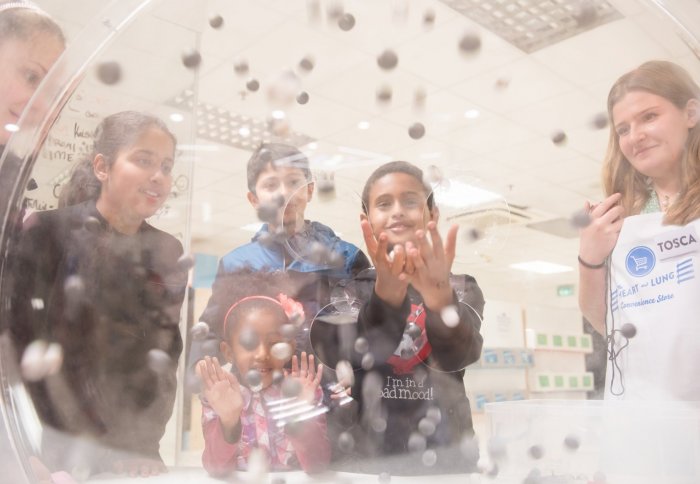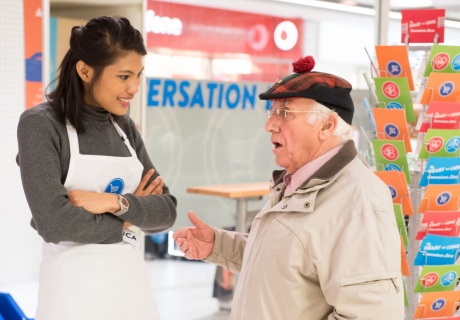Heart and Lung pop up shops shortlisted for national public engagement award

We are delighted that the National Heart and Lung Institute (NHLI) pop up shops have been selected as a finalist in the NCCPE Engage competition.
Across the UK researchers are engaging with the public in innovative and effective ways and thousands of people are getting involved with research. From inspiring young people with new advances in knowledge, to encouraging members of the public to contribute to research, university public engagement is thriving.
Even in a shopping mall in the midst of busy daily lives, people are interested in engaging with science, fascinated by research and keen to enter into discussions.
– Ellen Dowell
Researchers from the NHLI at Imperial College London have been shortlisted for a national award for their public engagement work. Our pop up shops are one of three projects shortlisted for the Science, Technology, Engineering and Maths (STEM) award, in the national Engage Competition run by the National Co-ordinating Centre for Public Engagement (NCCPE).
The Heart and Lung pop up shops appeared at the Kings Mall, Hammersmith in London, allowing NHLI scientists to directly engage with the local community sharing their latest research and passion for science. The Heart and Lung Repair Shop was our first science pop up shop bringing together designers and NHLI scientists to create interactive exhibits and activities. The shop imagined what a repair shop would look like for hearts and lungs, bringing the latest research in this area into an interactive and thought provoking environment for the wider public. This was followed by The Heart and Lung Convenience Store which explored the future of heart and lung healthcare and how medicine is becoming more available, more personalised and more convenient.
We asked Ellen Dowell, NHLI's Public Engagement Officer, who heads up the projects with Professor Sara Rankin, a few questions about the projects to date and being nominated for this award.
How do you feel about being shortlisted as a finalist for the NCCPE Engage Competition 2016?
It’s fantastic to be shortlisted for the NCCPE Engage Competition. There were so many people involved in the heart and lung pop up shops, with over 150 scientists and clinicians from NHLI engaging people with their fascinating research. Plus more than 20 designers and creative collaborators who transformed our empty retail units so imaginatively. Not to mention the six brilliant MSc Science Communication students who made sure everything ran smoothly over the 28 days the shops were open. It is a testament to the hard work and enthusiasm of everyone involved.
How have the pop-up shops been received by the public?
We had over 5,500 visitors to The Heart and Lung Repair Shop and The Heart and Lung Convenience Store. We asked people to write us a shop review and the average star rating people gave the experience 4.7 out of five. People found a pop up science shop to be quite a unique concept and they really enjoyed spending time with researchers, having one-to-one conversations and being able to ask lots of questions. Even in a shopping mall in the midst of busy daily lives, people are interested in engaging with science, fascinated by research and keen to enter into discussions.
What benefits have you seen for the scientists and public involved?
The pop up shops created a brilliant platform for NHLI researchers to have a go at public engagement, often for the first time and to develop their own short talks, demos and activities. This meant that the experience of the pop up shops increased researchers’ confidence and understanding of public engagement and motivated them to do more. We engaged with a diverse community audience, many of whom do not usually visit science festivals, events and museums.
Why is public engagement important?
Science has a huge impact on our daily life and how it might be transformed in the future, so it is enormously important that researchers engage with the public. An integral part of their job should be to exchange knowledge, opinion and values for the benefit of research and society more generally. Science is also a fascinating part of human culture and should be celebrated in the same way that we celebrate music, art, food, literature and all the other aspects of our culture.
It is also important to think about where engagement happens. We learned that designing engagement experiences for everyday community settings is a great way to reach diverse audiences. Undertaking this project has changed the way we think about the places where engagement happens. Too often we expect people to enter potentially intimidating spaces rather than meeting people where they already spend time.

Being shortlisted for the NCCPE award is a remarkable achievement – finalists have been selected from over 180 entries which demonstrate a broad range of high quality activities to inspire and involve public audiences. Paul Manners, Director of the NCCPE said “The Engage Competition is a highlight of our work at the National Co-ordinating Centre for Public Engagement. It uncovers amazing people, projects, partners and research. This year did not disappoint. The quality of the applications has been higher than ever, showcasing the very best of engagement practice across all disciplines and participant groups - reaching from the very local to the global.”
Article text (excluding photos or graphics) © Imperial College London.
Photos and graphics subject to third party copyright used with permission or © Imperial College London.
Reporter
Ms Helen Johnson
Communications Division